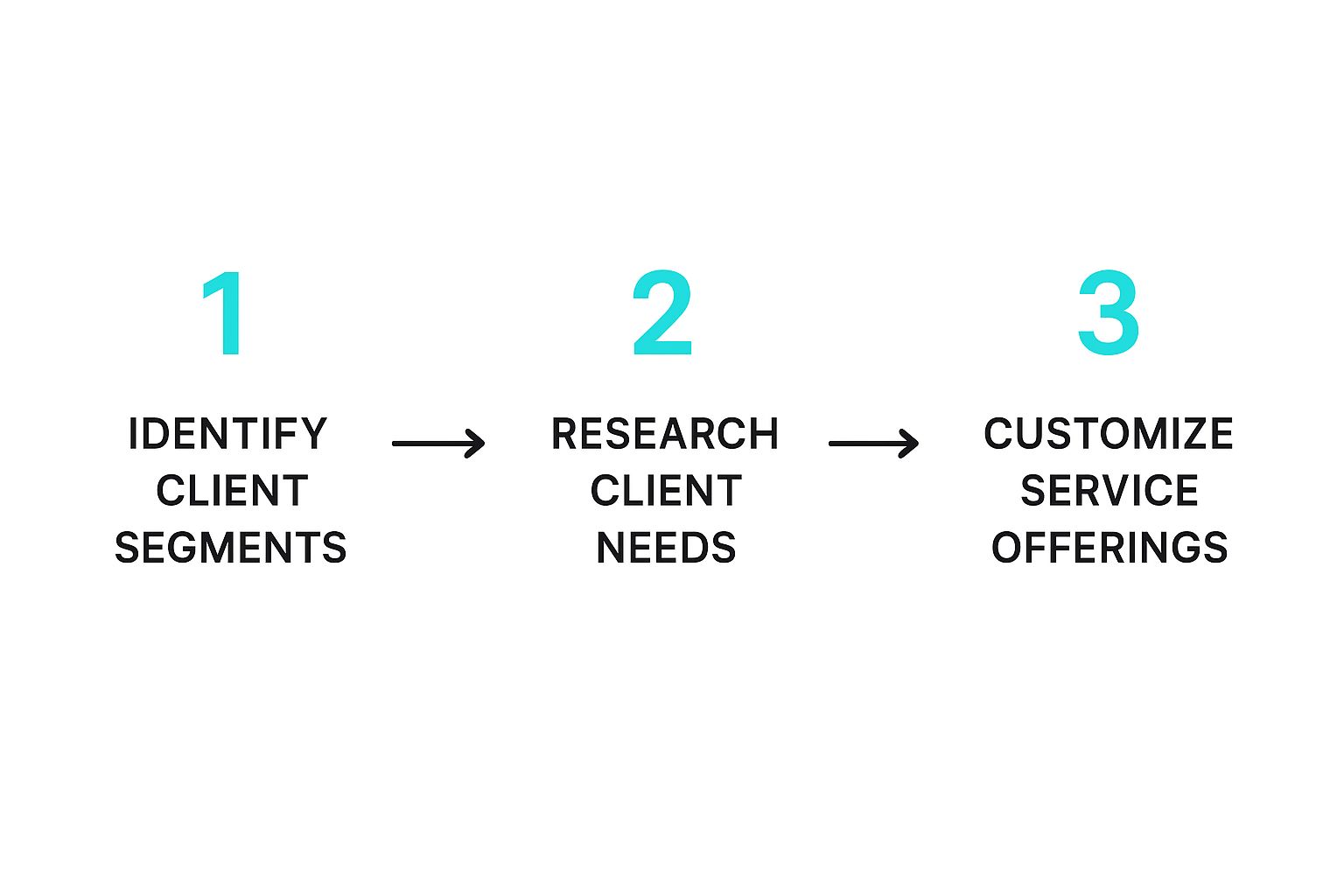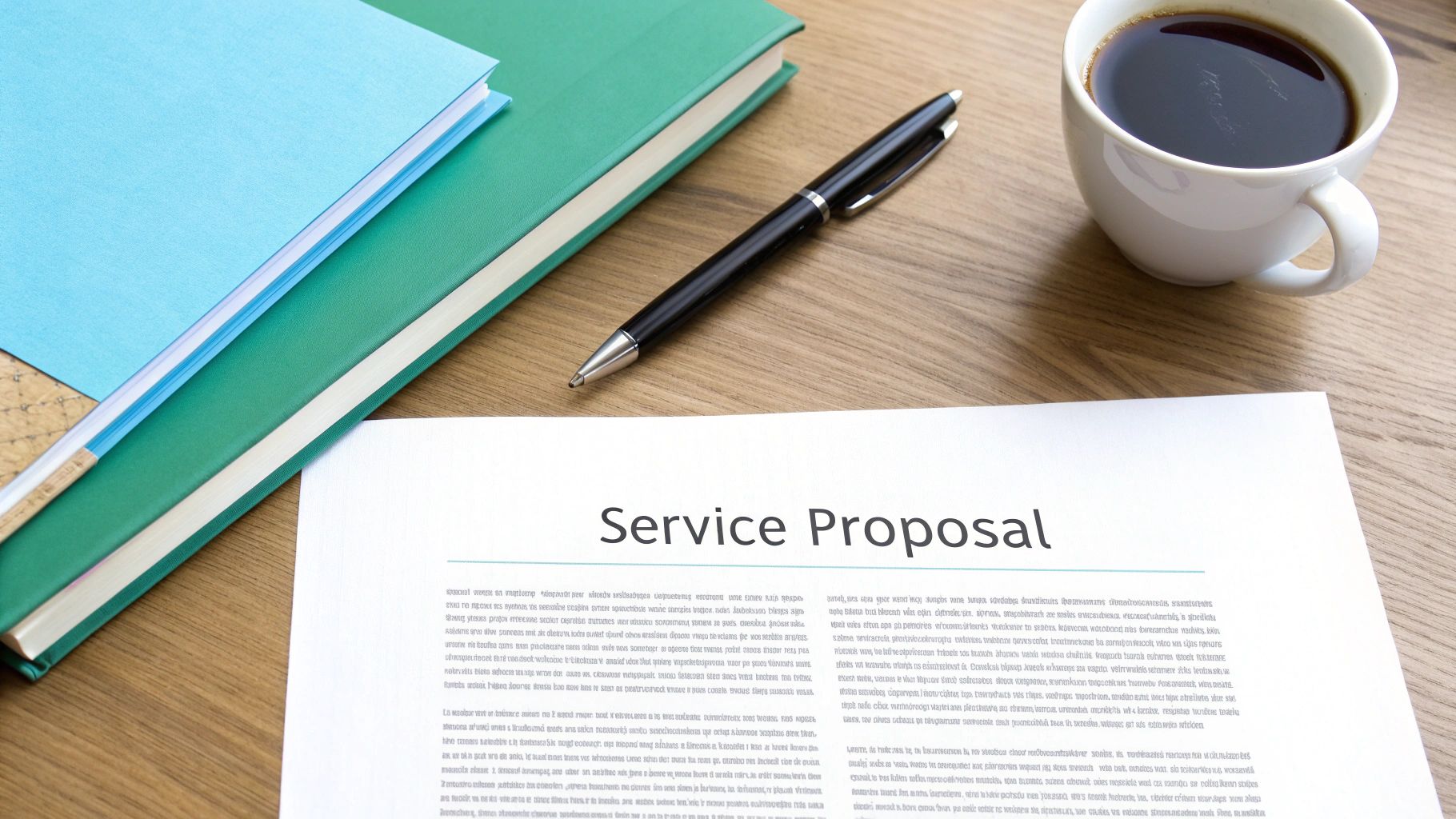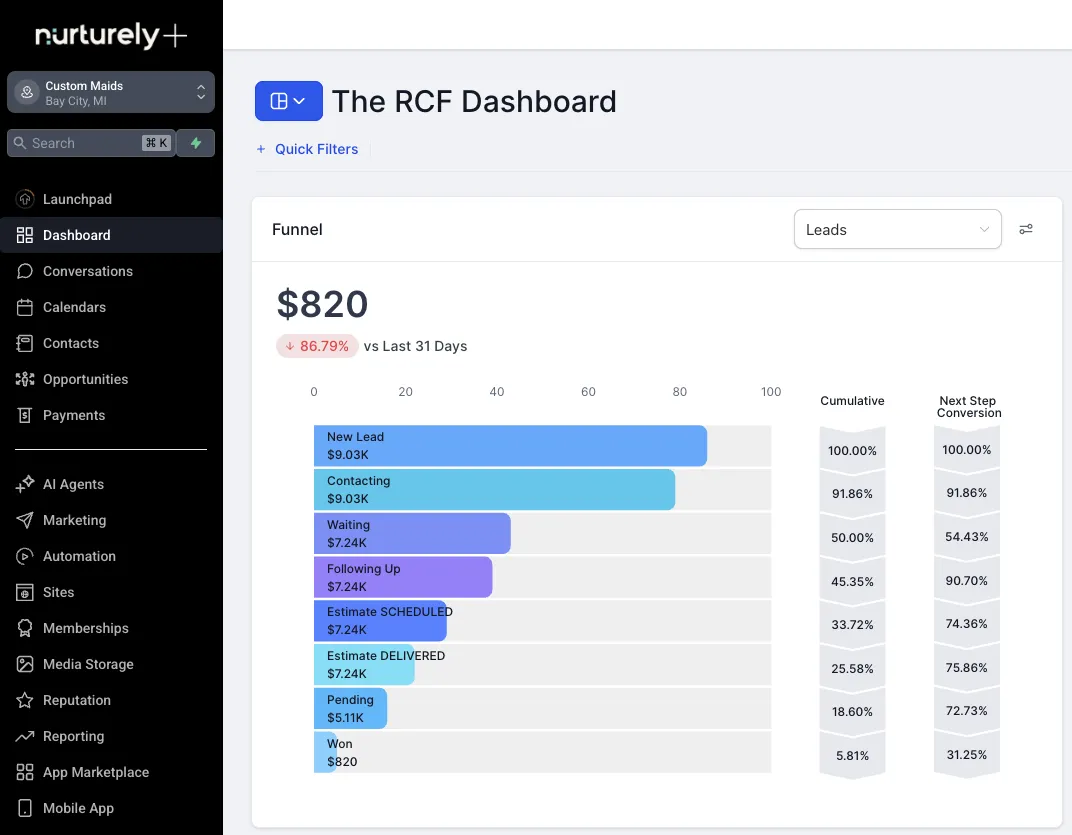How to Get Cleaning Contracts
How to Get Cleaning Contracts: Proven Strategies to Grow
So, you want to land your first cleaning contract. Let's be real—it's not about getting lucky. It really comes down to a few key things: figuring out who your ideal clients are, building a brand that looks professional, and putting together a proposal they can't say no to. It’s a process, but once you get it down, you can repeat it to build some serious momentum and prove you're the real deal.
Your Blueprint for Winning Cleaning Contracts

Landing consistent, high-value cleaning contracts is the bedrock of a successful cleaning business. I know it can feel like a huge mountain to climb, but the path from finding a potential client to getting that signed agreement is actually pretty logical. Think of this guide as a field-tested playbook, designed to help you build a profitable pipeline of work, whether you're just starting out or looking to scale up.
The good news? You’re jumping into a market that’s absolutely booming. The global cleaning services market was recently valued at around USD 415.79 billion and is only expected to keep growing. This demand, coming from both commercial and residential clients, creates a massive opportunity for businesses like yours. You can dig into the details on the cleaning services market growth to see just how big the potential is.
The Two Pillars of Cleaning Contracts
Before you even think about prospecting, you need to understand the two main arenas for cleaning contracts. They’re different worlds, each with its own type of client, service model, and approach.
Residential Cleaning: This is all about homes—apartments, condos, you name it. Your contracts are usually with homeowners or tenants directly, and they tend to be for recurring appointments or shorter-term jobs. The name of the game here is personal trust. You have to deliver consistently amazing service to keep them happy.
Commercial Cleaning: Here, you're focused on business properties like offices, medical clinics, retail stores, and warehouses. These contracts are almost always longer-term, more formal, and involve a more competitive bidding process. Being reliable, professional, and able to work around a business's schedule are your biggest selling points.
Picking a lane early on will make your life so much easier. It helps you focus your marketing, nail down your services, and set the right prices. You can do both, of course, but specializing lets you become the go-to expert in one area, which makes it way easier to attract the right clients and charge what you're worth.
Key Insight: Don't try to be everything to everyone. Deciding whether to pursue residential or commercial contracts first will sharpen your strategy and make every other decision—from marketing to pricing—much clearer and more effective.
Quick-Start Guide to Securing Cleaning Contracts
To give you a bird's-eye view, I've put together a table that breaks down the core strategies we'll be covering. This is the stuff that really moves the needle when it comes to winning new business.

This table is your cheat sheet. Master these areas, and you'll be well on your way to building a steady stream of profitable contracts.
This guide will walk you through the actionable strategies you need to get this done. From pinpointing the most profitable clients to mastering the art of the follow-up, you'll get the confidence to not just compete, but win the contracts that will fuel your business’s growth for years to come.
Finding and Targeting Profitable Clients
Stop wasting time chasing every possible lead. That's a rookie mistake. Real success in the cleaning industry isn't about luck; it's about a focused, proactive approach that fills your schedule with valuable, long-term contracts.
First things first, you need to know who you're selling to. The game is completely different for commercial versus residential. Commercial contracts—think offices, industrial sites, medical clinics—are the long-term bread and butter. They often mean higher revenue and more stable work.
Residential jobs, on the other hand, are all about personal trust. The contracts might be shorter, maybe six to twelve months, but a happy homeowner can become a client for life. Understanding this difference is everything. It tells you where to put your energy for the best possible return.
Identify Your Ideal Client Profile
Before you can find your next contract, you have to know exactly who you're looking for. A vague goal like "I want more cleaning contracts" isn't a strategy, it's a wish. You need to build an Ideal Client Profile (ICP). This is just a detailed description of the perfect business or homeowner you want to serve.
A commercial ICP isn't just "offices." It's specific. For example:
Industry: Medical or dental clinics.
Size: Facilities between 3,000 and 8,000 square feet.
Need: Specialized sanitation, usually after-hours.
Value: Cares more about reliability and compliance than getting the absolute lowest price.
And for residential, it might look like this:
Location: Specific affluent neighborhoods or new housing developments.
Home Size: 3-5 bedroom homes, over 2,500 square feet.
Need: Recurring weekly or bi-weekly service.
Value: Wants a trustworthy, insured team and is willing to pay for eco-friendly products.
Creating this profile forces you to get laser-focused. It makes your prospecting so much more efficient because you know which doors to knock on and what to say when they open.

Performing Local Market Research
Once you've got your ICP locked in, it's time to go hunting. You need to find where these ideal clients actually exist in your service area. This isn't guesswork; it's active research. I'm talking about digging through local business directories, Chamber of Commerce member lists, and commercial real estate listings.
You also need to keep your eyes peeled for signs of growth and change. These are your golden tickets.
New Construction: A new office park or retail center is a goldmine of opportunity.
Business Expansions: Companies moving into bigger spaces need new or better cleaning services.
"For Lease" Signs: A new tenant is coming soon. This is your chance to get in on the ground floor before anyone else.
Pro Tip: I can't stress this enough—drive through your target commercial zones regularly. Make notes of new businesses, construction sites, and companies that look like they're expanding. This kind_of "boots-on-the-ground" intel is almost always more current than what you'll find online.
This whole process shifts you from being a reactive bidder, waiting for jobs to be posted, into a proactive partner who sees a need before the client even knows they have one. For more ideas on this, check out our deep-dive guide on how to get cleaning clients.
Here's a simple visual that breaks down how this targeting workflow should look.

As you can see, it's all about moving from a broad idea to a very specific, customized offer.
Actionable Prospecting Methods That Work
Okay, you have your list of potential clients. Now what? Generic email blasts are a waste of time and will get you nowhere. Your outreach has to be personal, relevant, and immediately show your value.
Targeted Cold Outreach: Don't send a generic "we clean stuff" email. Reference something specific you noticed. For example, "I saw your dental practice just expanded its wing on Maple Street. We specialize in providing compliant sanitation for medical facilities and would love to put together a quote for you." See the difference?
Networking with Property Managers: These people are the gatekeepers to entire buildings. Get to know them. Go to local business events, build real relationships. They can be an absolutely incredible source of referrals for commercial cleaning contracts.
Using Professional Networks: LinkedIn is your best friend here. You can find the exact facility manager or office manager at a company you're targeting and send them a personalized message. It’s way more effective than getting lost in a general "contact us" form.
Digital Presence: You have to look professional online. Having a solid website and a fully optimized Google Business Profile is non-negotiable. It’s how you capture local search traffic from people actively looking for your services. To really dial this in, you should explore digital marketing strategies specifically for cleaning services.
Crafting a Proposal That Closes the Deal

So you've found the right prospect and absolutely nailed the walkthrough. Now what? The proposal is where the rubber meets the road. It’s that final handshake, the one document that separates you from every other cleaning company bidding for the job.
Let’s be honest: a generic, copy-paste proposal is a one-way ticket to the trash folder. But a sharp, customized proposal can win you the contract—even if you aren't the cheapest option. It’s your chance to prove you were listening and to show them your value goes way beyond a simple price tag.
The Anatomy of a Winning Proposal
Your proposal isn't just a price list; it’s a sales tool. To build trust and look like the professional you are, there are a few things you absolutely must include. Miss any of these, and you risk looking unprepared.
Here’s a look at the essential components that should be in every single proposal you send. Think of this as your pre-flight checklist before hitting "send."

Nailing these sections positions you not just as a vendor, but as a serious, organized business partner they can rely on.
How to Talk About Value, Not Just Price
In commercial cleaning, the lowest bidder rarely wins. Why? Because businesses care more about reliability, quality, and peace of mind than saving a few bucks. Your proposal is the perfect place to show them why you're worth it.
Don't just list what you do—explain the benefit of what you do.
For example, instead of a line item that just says, "Daily trash removal," reframe it: "We ensure a clean, hygienic workspace for your team to start their day fresh by managing all waste and recycling disposal." It's a subtle shift, but it connects your service directly to their desired outcome: a productive, happy team.
Your proposal needs to answer "Why you?" not just "How much?" Focus on reliability, quality, and the specific problems you solve that others don't.
This is also where you flex your company's unique selling points. Use eco-friendly products? Say it. Assign a dedicated account manager to every client? Make that a feature. These details add tremendous value and can easily justify a higher price. To really make your proposals shine, you might look into a pitch perfect sales proposal software that helps package all this information beautifully.
Structuring Your Price for Profit and Appeal
How you price your services is just as strategic as the services themselves. You have to find that sweet spot between being competitive in your market and actually being profitable. There are three common ways to do it.
Hourly Rate: This is simple and great for one-off jobs or initial deep cleans. It's easy for clients to grasp, though some might start watching the clock. A typical range is $30-$50 per hour for each cleaner on site.
Per-Square-Foot Rate: This is the industry standard for most commercial contracts because it’s transparent and easy to scale. Rates usually fall between $0.05 and $0.20 per square foot, but this can swing wildly based on the type of facility and how often you're cleaning.
Flat Fee: This is my personal favorite for recurring work. You agree on a set monthly or weekly price for a specific scope of services. It gives you predictable revenue and gives the client a predictable expense. Win-win.
Before you can set a price, you have to know your costs inside and out. That means labor, supplies, insurance, gas, and even your software subscriptions. Once you have that number, add your profit margin—usually 15-25%—to get your final price.
And a final word of advice: always check what your local competitors are charging to make sure you're in the right ballpark, but never get into a race to the bottom. Under-pricing your work is the fastest way to kill your business.
Building a Professional and Trustworthy Brand
In a cut-throat market, the quality of your cleaning isn’t always enough to win the big contracts. Your brand is your reputation, and it starts working for you long before you ever send a proposal or show up for a walkthrough. It's the first thing a potential client sees, and a professional image builds instant trust.
This isn’t about shelling out for a massive marketing budget. It’s about being smart and taking practical steps to make your cleaning business look credible. You'd be surprised how much the small details matter to a property manager deciding who to trust with their building.
Your Visual First Impression
Put yourself in the client's shoes. When they see your company van, get your business card, or meet your team, what’s the immediate vibe? A cohesive, professional look screams that you're organized and detail-oriented—which is exactly what they’re hiring you for.
Here are a few things that are non-negotiable in my book:
A Clean Logo: It doesn't need to be some masterpiece, but it absolutely must look professional. A simple, modern logo can be created on a tiny budget and instantly sets you apart from the competition using generic clip art.
Professional Business Cards: This is such a small investment with a huge payoff. A well-designed card with your logo, contact info, and website helps you stick in someone's mind long after you've left their office.
Branded Uniforms: Simple polo shirts or even t-shirts with your logo make your team look unified and professional. It immediately tells a client that everyone on their property is part of a legitimate, accountable company.
If you’re just starting out, taking a moment to nail these basics is one of the most important things you can do. There are some really essential brand strategy tips for startups that apply directly to service businesses trying to land their first big clients.
Establishing Your Digital Storefront
Let’s be real: if you don’t exist online, you might as well be invisible. Your digital presence is your #1 tool for getting found by clients who are actively looking for the services you provide. In fact, a staggering 93% of people use online search to find local businesses.
You don't need a complex, ten-page website to get started. Just focus on these two essentials:
A Simple, Professional Website: Think of this as your digital brochure. It needs to clearly state what you do, where you do it, and how to get in touch. Pro tip: include real photos of your team in their uniforms and sprinkle in some testimonials from happy clients.
A Google Business Profile (GBP): This is, without a doubt, the most powerful free marketing tool for any local service business. A complete GBP gets you on Google Maps and in those "office cleaning near me" search results.
Key Takeaway: Your website and Google Business Profile are a one-two punch for establishing legitimacy. A client who finds you on Google will almost always click over to your website to make sure you're a real, professional operation before they even consider picking up the phone.
Leveraging Social Proof to Build Trust
Nothing sells your service better than a happy customer. Testimonials and online reviews are what we call social proof, and they basically do the selling for you. They build a bridge of trust with new prospects by showing that other businesses just like them already trust you with their keys.
Make it a standard part of your process to ask for a review after a job is done. Don't be shy about it! If you've delivered great work, most clients are happy to take a minute to share their experience.
Display these glowing testimonials right on your homepage and share positive reviews on your social media. Every single one strengthens your reputation. In fact, proactively managing what people are saying about you online is a core part of winning new business, and it's worth learning more about active brand reputation management to protect and grow your image.
So you’ve landed your first few cleaning contracts. That's a huge milestone. But the real game begins now. Moving from a small-time operator to a real force in your market isn't just about finding more work—it's about strategically scaling your entire operation to land bigger, more complex, and way more profitable deals.
The potential here is massive. The global cleaning services market is on its way to hitting USD 468.2 billion. Just the commercial side of things accounts for over $100 billion in revenue. Even though there are more than 2.5 million cleaning businesses out there, over 90% are tiny operations with fewer than 10 employees. This leaves a huge gap for companies that can get their act together and scale properly. You can discover more insights about the cleaning industry's growth to see just how big this opportunity is.

Find Your Niche and Stop Competing on Price
One of the fastest ways to break out of the "race to the bottom" is to stop being a jack-of-all-trades. When you specialize, you're no longer just "another cleaning company." You become the go-to expert for a specific type of job.
This expertise is what lets you charge premium rates. You bring specialized equipment, knowledge, and processes that the generalists just can't compete with.
Think about these high-demand, high-profit niches:
Post-Construction Cleaning: This isn't your average cleanup. It's a detailed, multi-phase process on new or renovated sites. You have to know how to safely handle construction dust, debris, and leftover materials.
Medical Facility Cleaning: We're talking clinics, dental offices, and labs with strict sanitation rules and compliance standards (like HIPAA). Specializing here makes you a trusted partner, not just a vendor.
Eco-Friendly "Green" Cleaning: Sustainability is a huge deal for businesses now. Offering certified green cleaning services is a powerful way to stand out, especially with this part of the market set to explode.
Key Insight: Specializing isn't about limiting yourself; it's about focusing your power. When you're the best at one specific thing, you attract higher-quality clients who are happy to pay for real expertise.
Learning to Navigate Formal Bids and RFPs
As you grow, you'll start running into more formal bidding processes, especially with bigger corporations or government jobs. These usually come as a Request for Proposal (RFP). An RFP is basically a detailed document where a potential client spells out exactly what they need and invites qualified companies to submit a comprehensive bid.
Responding to an RFP is a whole different beast than firing off a simple quote. It takes serious attention to detail and a professional touch. You’ll need to prove your company's capabilities, lay out detailed service plans, show proof of insurance and bonding, and often provide client references or case studies.
It's demanding work, for sure. But winning a single RFP can lock in a multi-year, high-revenue contract that brings incredible stability to your business.
As you start managing more of these complex bids and a growing list of clients, keeping track of everything is critical. This is a perfect place to automate data entry and other admin tasks so leads and follow-ups don't fall through the cracks. It frees you up to focus on what matters: winning bigger contracts.
Build a Referral Machine Through Smart Partnerships
Honestly, one of the smartest and most sustainable ways to scale is by building a powerful referral network. Instead of constantly hunting for one-off clients, you can create a steady stream of pre-qualified leads by partnering with other businesses that serve the same people you do.
Think about it: who else is working with your ideal clients before they need a cleaner?
Here are a few no-brainer partnership opportunities:
Real Estate Agents: They constantly need homes cleaned for staging, showings, and move-in/move-out services.
Construction Firms & General Contractors: A perfect match if you specialize in post-construction cleaning. A solid relationship here can mean a steady flow of work.
Property Management Companies: These firms manage dozens, sometimes hundreds, of commercial or residential buildings. They are always on the lookout for reliable, professional cleaning crews.
Event Venues: They need meticulous cleanups after weddings, corporate events, and conferences.
For these partnerships to actually work, it has to be a two-way street. Don't just ask for leads; actively look for ways to send business back to your partners. When you build these kinds of mutually beneficial relationships, you stop chasing contracts and start having them come directly to you. You're not just getting a lead—you're getting a warm introduction from a trusted source, which makes closing the deal a whole lot easier.
Of all the questions that come up when you’re trying to figure out how to get cleaning contracts, a few pop up over and over. Getting straight answers is the only way you’re going to move forward with any real confidence. So, let’s tackle the ones we hear most from cleaning business owners, both new and growing.
How Much Should I Charge for a Cleaning Contract?
Pricing can feel like you’re just throwing a number at the wall and hoping it sticks, but it needs to be a calculated move. Your rates are going to swing wildly based on your city, the kind of building you’re cleaning, and exactly what’s in the scope of work.
There are a few ways to approach this:
Hourly Rates: This is usually anywhere from $30 to $50 per hour for each cleaner you have on-site. It makes sense for those first deep cleans or smaller jobs where the time needed isn't super predictable.
Per-Square-Foot Rate: This is the bread and butter for a lot of commercial contracts. You'll see rates between $0.05 and $0.20 per square foot, but don't take that as gospel. A simple office is way different from a messy warehouse.
Flat Fee: Just a set price, usually per month. This is the goal for recurring contracts because it gives you predictable income and the client gets a stable, easy-to-budget cost.
Before you can even think about a price, you have to know your costs cold—labor, supplies, insurance, gas, and all the other overhead. Add your profit margin on top of that. And yes, you should absolutely poke around to see what competitors are charging, but this is crucial: never get into a race to the bottom. Underpricing your work is a fast track to going out of business.
Do I Really Need Insurance to Get Cleaning Contracts?
Yes. Absolutely, 100%. This isn't just a friendly suggestion; it's a hard requirement for any serious cleaning business. General liability insurance is completely non-negotiable. Most commercial clients, especially the bigger fish, won’t even give your proposal a second glance if you don’t have proof of insurance.
Here’s the real deal: Insurance does way more than just protect your business from the insane costs of accidental property damage or injuries. It sends a powerful signal to clients that you're a legitimate, professional, and responsible operator they can trust with their keys and their property.
What Is the Best Way to Find My First Cleaning Contract?
When you're starting from zero, your best tool isn't some fancy marketing campaign—it’s the people you already know. Start by telling everyone that you've launched a cleaning business. Your next-door neighbor's cousin might be the lead you've been looking for.
Get yourself to local business networking events. You want to meet property managers, real estate agents, and office managers—these are the gatekeepers who hand out commercial cleaning contracts. Another great move is to spot newly opened local businesses and just walk in with a professional intro and a targeted offer.
And do this today: set up your Google Business Profile. It's totally free, puts your business on the map, and starts pulling in local leads from people who are literally searching online for the exact services you provide.
Should I Specialize in a Certain Type of Cleaning?
It's totally fine to start with general jobs to get your feet wet and build some experience. But specializing? That can be a total game-changer for your growth. Instead of being a jack-of-all-trades, you become the go-to expert for a specific—and often more profitable—niche.
Think about high-demand areas like:
Medical or dental office cleaning (they have strict standards)
Post-construction site cleanup (it's messy and requires specific know-how)
Eco-friendly "green" cleaning services (a huge selling point for many businesses)
When you specialize, you can almost always charge more. Why? Because you have less competition and you're seen as an expert. It also makes your marketing ten times easier because you’re not shouting into the void; you’re talking to a specific audience with very specific problems you can solve.
Managing your leads, sending out sharp-looking proposals, and actually following up are what separates the businesses that win contracts from those that don't. Nurturely Plus pulls every tool you need—from a CRM built for this work to automated follow-ups—into one spot. You get to focus on growing your cleaning business, not wrestling with a bunch of different software. Learn how you can turn strangers into customers.



